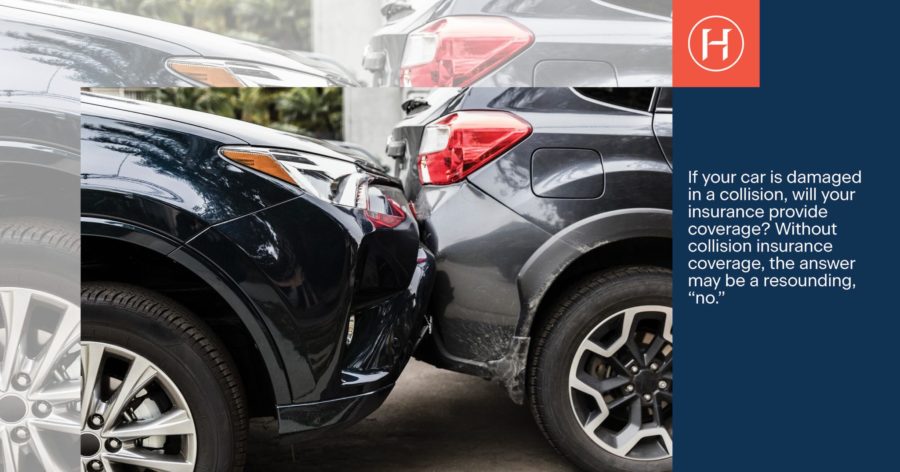If your car is damaged in a collision, will your auto insurance provide coverage? Without collision insurance coverage, the answer may be a resounding, “no.” If you own a car, you should keep reading to learn more about this coverage, why it’s important and how to decide if you need it.
Collision Insurance Definition
As the name suggests, collision insurance provides coverage for damage to the insured’s vehicle that results from a collision. This could be a collision with another vehicle or another object, such as a tree or pole. It can also provide coverage for collisions that do not involve other objects, such as rollover accidents and damage that occurs from hitting a pothole.
Collision coverage is not the same as property damage liability insurance. Property damage liability insurance is often required under state law, and it provides insurance coverage for property damage to another person’s property resulting from a crash that you cause. Collision insurance provides coverage for property damage to your own vehicle.
Collision and Comprehensive Coverage
Collision and comprehensive coverage are often paired together, but they are actually distinct coverage types.
As discussed above, collision insurance provides coverage in the event that the insured’s vehicle sustains damage in a collision. Comprehensive coverage also provides coverage for the insured’s vehicle, but it covers events other than collision. The losses covered by comprehensive coverage typically include things like fire, flood, falling rocks, theft, vandalism and animals.
Is Collision Coverage Required?
Collision insurance is typically considered an optional coverage. This means that it is not usually required under state law. However, this does not mean that coverage is not important. In some cases, collision coverage may even be mandatory. This is because many auto lenders include collision insurance requirements in their contract terms. Auto lenders also typically require borrowers to purchase comprehensive auto insurance.
This means that if you buy your car using a loan, you will most likely need to maintain collision and comprehensive coverage for the life of your car loan. For this reason, insurance companies typically ask about whether or not you have a car loan when you request an auto insurance quote or apply for auto insurance coverage.
The Cost of Auto Collision Insurance
The best way to find out how much you will pay is to request a quote.
How much you pay for collision coverage will depend on various factors, such as the value of your car and where you live. The deductible can also impact your collision insurance rates. You may be able to lower your premium by selecting a high deductible. However, it’s important to remember that you’ll need to pay this deductible out of pocket if you ever have to file a claim. Make sure you can afford it.
What Other Insurance Coverage Types Should Drivers Have?
Collision insurance coverage is an important auto insurance coverage type for drivers, but it’s not the only coverage that drivers should consider. The coverage types you need will depend on both your personal situation and the insurance laws in the state where you live. States set their own auto insurance rules, so coverage terms can vary from state to state. Also, all coverages will be subject to the policy limits and the terms of coverage in your policy.
Here are some more coverage types to look at.
Property Damage Liability Insurance: Most states require drivers to carry property damage liability insurance. If you are at fault in a car crash, this coverage will pay for damage to third parties.
Bodily Injury Liability Insurance: This is another type of insurance coverage commonly required under state law. If you are at fault in a car crash, this coverage will pay for injuries to third parties. It can cover medical expenses as well as certain related costs, such as lost income.
Comprehensive Insurance: As discussed above, this coverage type provides protection for your vehicle for many losses other than collision.
Personal Injury Protection: This coverage type is required in some states that use a no-fault system of car insurance. Personal Injury Protection, or PIP, provides coverage for injuries sustained by the insured as well as the passengers. PIP may also cover lost income and certain other expenses related to the injury.
Medical Payments Coverage: Also called MedPay, this policy type can provide coverage for medical costs for the insured as well as passengers.
Uninsured Motorist Insurance: Although most states require auto insurance coverage, some drivers let their policies lapse. If you are hit by an uninsured motorist, uninsured motorist insurance can provide coverage.
Underinsured Motorist Insurance: States set minimum insurance requirements, and some states have fairly low requirements. If you are hit by a driver, the driver’s policy limits might not be sufficient to cover your costs. Underinsured Motorist Insurance can help.
Gap: New cars depreciate, or lose value, quickly. If you buy a new car with a loan and the car is totaled or stolen, you may end up owing more than the car is worth. Because auto insurance policies often pay claims based on the current market value, your claim payout might not be enough to cover your debt. Gap insurance provides coverage for this difference.
Umbrella Insurance: Umbrella insurance provides excess liability coverage for other standard policies, such as auto and homeowners. If you want more liability coverage, you might want to consider this option.
Do You Need Collision Insurance?
If you have a car loan that requires collision insurance coverage, this is an easy question. Yes, you need collision insurance. If you aren’t required to purchase collision insurance, you’ll have to decide whether or not you think this coverage type is worth the premium expense.
Consider what would happen if your car was seriously damaged in a crash. Would you have the money needed for repairs? Could you afford to buy a new car if necessary? Without a car, how would your work and personal life be disrupted?
A Higginbotham insurance broker can help you review your coverage options, including collision insurance and other auto insurance coverage types. Contact us to learn more.





